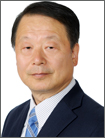222nd ECS Meeting | Honolulu, HI | Oct. 8, 2012
Cell Bioelectrochemistry and Biomagnets
 Cells sense ions, chemicals, light, pressure, and temperature in order to effectively adapt to various conditions. Sensing is achieved by biological sensors that are constructed by the self-assembling of a number of molecules within the cell. Now scientists are starting to artificially create such biological systems using the genomes of cells by a synthetic bioengineering approach, and are trying to transcend native systems to utilize them for various applications. Because the biological reactions can be extracted as electrochemical signals, research combining electrochemistry and the synthetic bioengineering approach should provide us with new opportunities to develop various devices and materials for sensing. Professor Matsunaga opened the door to the fabrication of biosensors to detect the external stimulus using biological reactions within cells by a technique that measures direct electron transfer between cells and electrodes. He has successfully constructed a practical on-line biosensing system for toxic chemicals, which are detected as signals derived from oxygen consumption of cells. He has also proposed using geomagnetic sensors in bacteria as novel materials for biotechnological applications. These materials are inspired from the biological sensor and fabricated through the synthetic bioengineering approach based on the whole genome information of the organism. This talk will present his pioneering biosensors using cells and next-generation materials built up by molecule complexes.
Cells sense ions, chemicals, light, pressure, and temperature in order to effectively adapt to various conditions. Sensing is achieved by biological sensors that are constructed by the self-assembling of a number of molecules within the cell. Now scientists are starting to artificially create such biological systems using the genomes of cells by a synthetic bioengineering approach, and are trying to transcend native systems to utilize them for various applications. Because the biological reactions can be extracted as electrochemical signals, research combining electrochemistry and the synthetic bioengineering approach should provide us with new opportunities to develop various devices and materials for sensing. Professor Matsunaga opened the door to the fabrication of biosensors to detect the external stimulus using biological reactions within cells by a technique that measures direct electron transfer between cells and electrodes. He has successfully constructed a practical on-line biosensing system for toxic chemicals, which are detected as signals derived from oxygen consumption of cells. He has also proposed using geomagnetic sensors in bacteria as novel materials for biotechnological applications. These materials are inspired from the biological sensor and fabricated through the synthetic bioengineering approach based on the whole genome information of the organism. This talk will present his pioneering biosensors using cells and next-generation materials built up by molecule complexes.
Because various biological reactions in all organisms can be electrochemically monitored and controlled, this field of research has promising potential for various applications in biomedical and industrial sectors. Tadashi Matsunaga has pioneered the technologies of microbial sterilization, on-line biosensor for toxicity monitoring, biomagnets, etc. These multidisciplinary subjects, which originated from electrochemistry, will be introduced in this lecture.
Tadashi Matsunaga received his doctoral degree in biotechnology from Tokyo Institute of Technology in 1979. He then worked as a research associate in Miami (U.S.), returning to Japan to accept an Associate Professorship at Tokyo University of Agriculture and Technology (TUAT). Promoted to Full Professor in 1989, Prof. Matsunaga served as Dean of Engineering from 2001 to 2007, and as Trustee and Vice-President for Academic Affair and Research from 2007 to 2011; he has served as President of TUAT since 2011.
Dr. Matsunaga has been awarded several prizes for his research, including the 1994 Academic Award of the Chemical Society of Japan and the 2004 Prize of the Japanese Society for Bioengineering and Bioscience. He also received the Carnegie Centenary Professorship and the honorary degree of Doctor of Science from Heriot-Watt University in Edinburgh, the United Kingdom in 2003.
